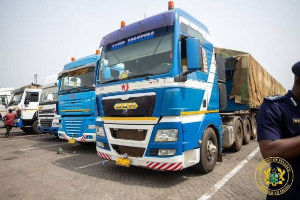By: Kwame Twumasi-Fofie
On my farewell visit to my medical doctor prior to my return to Ghana after almost three decades of living in Switzerland she gave me one piece of advice which has always been on my mind. She strongly advised me to be very careful about driving in Ghana. She explained further that the sad observation she had made about road traffic through her visits to ‘Africa’ over the years was that apart from the roads generally not being in good condition people also drove dangerously.
While I knew that to a large extent what she was saying was true I wasn’t in the mood to be lectured about what goes on in my own country by a foreigner who has never set foot there. The basis of my discomfort with her advice was that I’ve known Europeans, especially the Swiss, to claim to know everything about Africa when in fact they may have visited only one corner of the vast continent. In this specific instance I knew for a fact that while my doctor had visited East Africa on a number of occasions she had never been to West Africa. Secondly, even though I’ve lived outside the country for a considerable period of time I’ve been driving in Ghana any time I’ve been on visit since 1984. It didn’t take long for me to realise, however, that the experience of driving in Ghana for short periods while on holidays is nothing compared to living permanently here and driving on a daily basis. Indeed, and sadly, my doctor was very correct. Driving in Ghana is very hazardous!
First of all, while there has been a phenomenal increase in the number of vehicles on our roads over the years and indeed there has been a significant improvement in not only the number but also the quality of our roads not much effort has been made to educate drivers and pedestrians alike about road safety. Somehow we seem to believe that an occasional ‘road safety campaign’ especially close to festive days, is enough to stem the tide of avoidable deaths on our roads.
While indiscipline is without doubt one major cause of road accidents in Ghana there can be no doubt that all the authorities responsible for ensuring road safety have woefully failed in their duties, thus contributing significantly to the situation.
Local Alteration in Vehicle Design Isn’t it sad, for example, for the Drivers & Vehicle Licensing Authority (DVLA) to certify as ‘road worthy’ vehicles whose original design has been so altered that virtually all their original safety features have been tampered with? We may find it convenient to praise the ingenuity of our local artisans to convert vans originally designed to carry goods into passenger buses but who says merely putting seats in a goods train or a cargo plane makes them suitable for transporting humans?
Mini buses originally designed to carry seven (7) persons over short distances are licensed to carry nine (9) persons over long distances in Ghana. Add the usual three or so extra passengers ‘illegally’ added and you have the original 7-seater carrying up to 12 persons excluding babies on their mothers’ laps. Should it surprise anyone therefore, that road accidents in Ghana always result in unacceptably high number of deaths and serious injuries?
Indiscipline Versus Ignorance
It is common knowledge that many Ghanaian drivers, especially commercial drivers, are notoriously undisciplined. Many of them stop ANYWHERE, including the middle of roads, inside roundabouts, road exit and entry points, to pick and drop passengers without regard to whatever danger or inconvenience they may cause to other road users.
In certain areas of the ‘central business district’ of Sunyani metal fences have been erected to ensure that vehicles do not even stop there to ensure free flow of traffic. As if there’s no law in Ghana, however, these areas have been turned into taxi ranks right under ‘NO STOPPING’ signs and in the full glare of the police. Other common examples of undisciplined driving on our roads are driving through red traffic lights with impunity and driving towards oncoming vehicles on dual carriage-ways which is a very common occurrence in Sunyani. Rather than drive a few meters to a U-turn some drivers choose the easier but potentially dangerous option of driving on the opposite lane to their destination.
Not quite long ago there was this accident at the Weija-Kasoa toll booth on the Accra-Cape Coast road which claimed 12 precious lives. And it was all because some driver thought he was so clever that he could drive past a column of vehicles to avoid paying the required toll and at the same time jump the queue. And this is by no means an isolated case because I’ve been an eye witness to a driver doing the same thing on the Bechem-Kumasi toll booth. I don’t think there can be a better example of undisciplined and irresponsible behaviour than this.
On the other hand, however, when a driver fails to give way to pedestrians who have shown a clear intention of crossing at a Zebra Crossing he may not necessarily be guilty of indiscipline but rather of ignorance. The average Ghanaian driver doesn’t know that at the Zebra Crossing it’s the pedestrian who has priority! I challenge anyone to prove me wrong. On several instances vehicles have zoomed past me when I’ve stopped at a Zebra Crossing to let people cross. On one occasion, in fact, one such vehicle nearly ran into a group of pedestrians I had stopped for. And this is where I challenge the authorities responsible for road safety to prove that they are up to the task. The situation where both parties believe that a driver who stops for pedestrians at a Zebra Crossing is doing them a favour is certainly unacceptable. However, without vigorous and sustained public education we should not expect people to know this and many others by themselves.
Let’s ask ourselves whether a pedestrian who has been educated to understand that he/she has priority over vehicles at a Zebra Crossing will ignore the Crossing a few meters away and cross the street somewhere else? In fact sometimes you wonder if some of them are even aware that they can be killed by a passing vehicle. You only need to observe how leisurely they cross the street even when they are stopped by red light and vehicles have started moving to appreciate what I’m talking about.
Some years back if you saw a vehicle on the road at night without headlights you could bet it was because the headlights were defective. Today, however, drivers intentionally ignore to switch on their lights because they believe that the street lights provide them with sufficient light. Of course, they don’t know that their headlights are not only meant for them to see but also, and perhaps even more importantly, for them to be seen. That is why in some parts of the world motorists are required to put on their headlights even in broad daylight. And this way of thinking is not limited to drivers alone but also motorists, cyclists and pedestrians alike. Some pedestrians and cyclists believe that drivers see them as clearly as they see the vehicles which have their headlights on. This is nothing but ignorance!
Children And Road Safety
In countries where the safety of children is taken seriously no effort is spared at drawing attention of road users to the commencement of the academic year i.e. when kids are attending school for the first time. Police officers take school children to town and educate them on what to do and what not to do while in town including, of course, where, when and how to cross the road. School children are given practical education on how to use a bicycle in town, and children are educated on why they are not allowed to sit on the front seat. Compare that to the situation in Ghana where some parents proudly seat their children (sometimes up to three of them) on the front passenger seat, without seat belt, and sometimes even standing.
In radio advertisements of virtually all private schools one point which is always highlighted is that free transport is offered to the pupils. But I wonder if any of the responsible state authorities has ever bothered to find out how many children are crammed into some of these buses? For their information almost all of these school buses carry more than five times above capacity. Let’s assume that the school authorities don’t care, and the parents are ignorant of the obvious dangers their children are exposed to. But should we also assume that there is no institution in the country which is responsible for ensuring the safety of its citizens especially children who are the most vulnerable? But if (may God forbid) one day our luck runs out and one of these school buses is involved in an accident claiming lives that’s when we’re going to hear statements coming from all the powers that be. I wonder how long we should continue to behave like the proverbial ‘Wofa Kwasi’!
We are aware that no country has succeeded in completely preventing road accidents and I don’t expect Ghana to become the first to do so. However, for the same reason that we find it necessary to establish and maintain health facilities even though we do not expect that to stop people from dying, we have an obligation as a nation not only to educate our people, but also put all necessary measures in place and enforce existing laws to prevent unnecessary loss of lives and property on our roads. Fortunately, unlike the days when Information Service vans were needed to educate the public, today we have the benefit of the numerous radio and even television stations to conveniently and effectively do this. Let’s do it, for prevention is better than cure!
Kwame Twumasi-Fofie Sunyani














